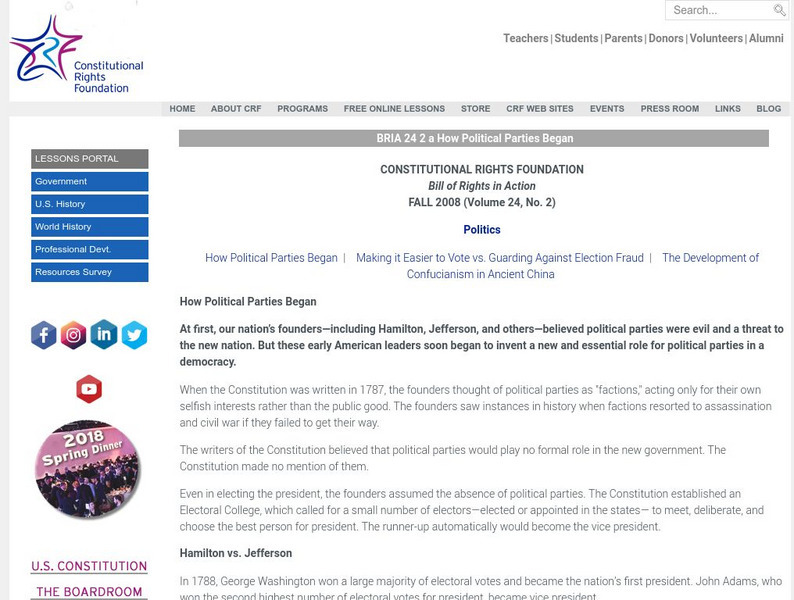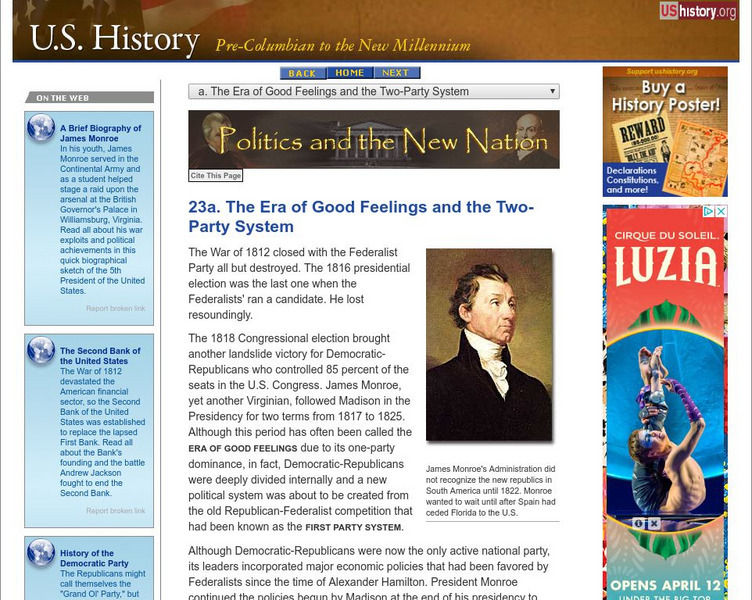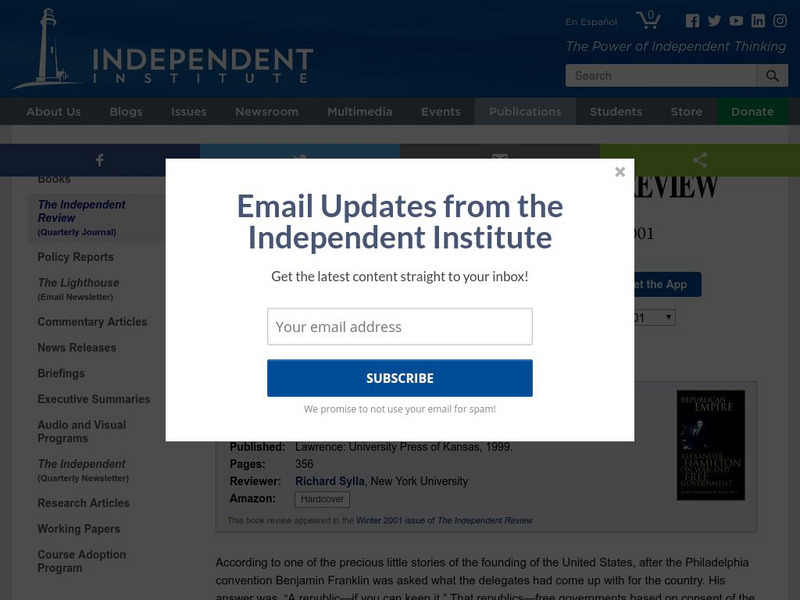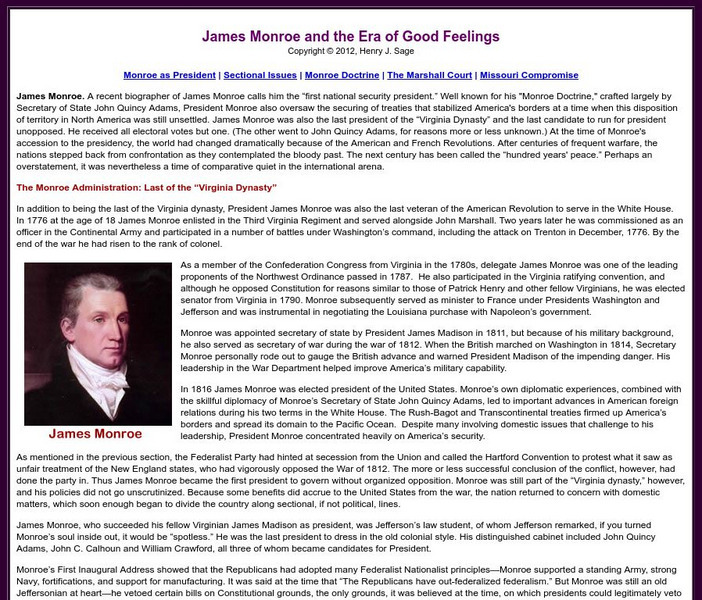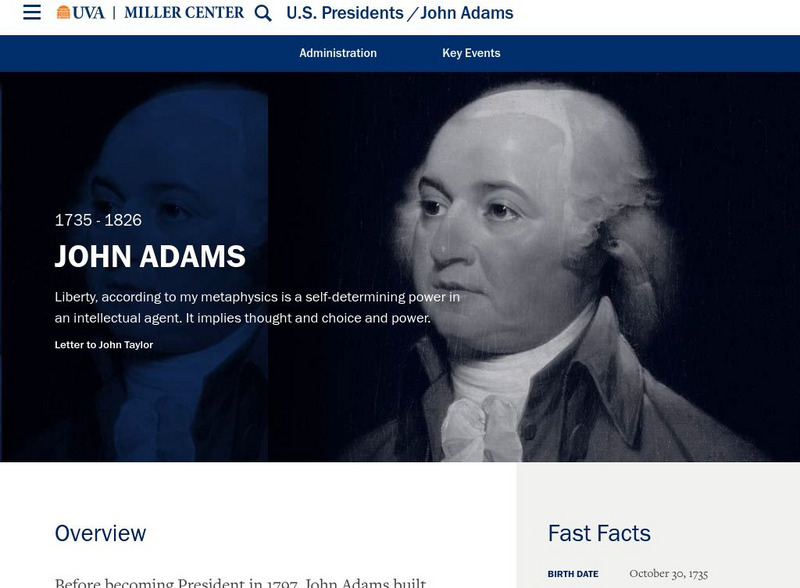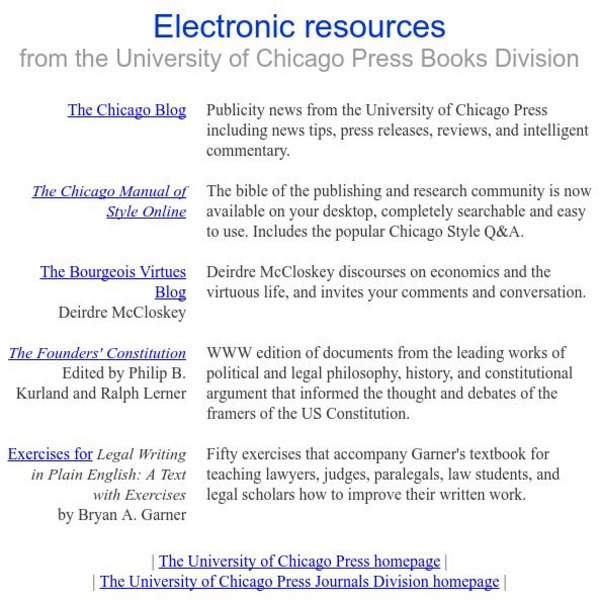Constitutional Rights Foundation
Constitutional Rights Foundation: How Political Parties Began
Activity in which students examine the history of political parties in America and evaluate the role they play and reasons they emerged. Questions for discussion and small group work to compare the late 1700s visions of Republicans and...
OpenStax
Open Stax: Competing Visions: Federalists and Democratic Republicans
After reading this section of a chapter on "The New Republic," students will be able to describe the competing visions of the Federalists and the Democratic-Republicans, identify the protections granted to citizens under the Bill of...
Siteseen
Siteseen: Government and Constitution: Federalist Papers
The Federalist Papers were a series of 85 essays that promoted the ratification of the United States Constitution and the nature of a Republican government.
University of Virginia
Miller Center at Uva: u.s. Presidents: James Monroe: Campaigns and Elections
An interesting look at the elections of 1816 and 1820 in which James Monroe ran essentially unopposed by the Federalists.
Gilder Lehrman Institute of American History
Gilder Lehrman Institute: Age of Jefferson and Madison
[Free Registration/Login Required] After a brief description of Thomas Jefferson's and James Madison's contributions to the early ideology and government of the new United States in their authorship of the Declaration of Independence and...
Independence Hall Association
U.s. History: Two Parties Emerge
Although George Washingon denounced the creation of political parties, they came roaring into play in the election of 1796 in which John Adams, representing the Federalists, ran against Thomas Jefferson, who represented the...
Khan Academy
Khan Academy: Us History: 1800 1848: The Election of 1800
The growing partisanship between the Federalist camp, led by John Adams, and the Democratic-Republican camp, led by Thomas Jefferson, resulted in a bitterly contested presidential election in 1800.
Independence Hall Association
U.s. History: The Election of 1800
The election of 1800 was momentous for many reasons. Read about the defeat of John Adams and his Federalist policies, and see how Thomas Jefferson became president because of a crucial vote by a Federalist.
Digital History
Digital History: War on the Judiciary
The Judiciary Act of 1801 was a final attempt by the Federalists to control the judicial system before the Democratic Republicans took over. Read about the repeal of the act, which resulted in a landmark Supreme Court decision, Marybury...
Independence Hall Association
U.s. History: The Era of Good Feelings and the Two Party System
The Era of Good Feelings lasted about a decade, spanning the administration of James Monroe. Read about the policies followed during his administration, and find out why, after the demise of the Federalist Party, there arose another...
American Presidency Project
American Presidency Project: Election of 1796
Online resource that provides data for the presidential election of 1796 won by Federalist nominee, John Adams.
Other
Independent Institute: Alexander Hamilton on War and Free Government
This is a review of a book by Kurt-Friedrich Walling. The review discusses how Hamilton wanted to create a republican empire based on consent but able when threatened to generate enormous military power, and how this was in dispute with...
Teaching American History
Teaching American History: From Bullets to Ballots Chapter 4
Doubts and Disunity, Was the Downfall of the Federalists Inevitable? is Chapter 4 from Zvesper's book, From Bullets to Ballots. Understand what happened to the Federalists, the Democratic-Republicans, as being too similar to what they...
OpenStax
Open Stax: Partisan Politics
By reading this section of a chapter on "The New Republic", students will be able to identify key examples of partisan wrangling between the Federalists and Democratic-Republicans, describe how foreign relations affected American...
US National Archives
Our Documents: The Alien and Sedition Acts (1798)
The Alien and Sedition Acts were passed by Congress in 1798 because of feared war with France. This engaging page gives you the opportunity to see a complete copy of the original document and also gives links to a typed transcript,...
Henry J. Sage
Sage American History: James Monroe and the Era of Good Feelings
A complete look at the administration of James Monroe and the policies of the Era of Good Feelings. You can read about the domestic policies, foreign affairs, and important decisions of the Supreme Court made during the Monroe...
PBS
Pbs News Hour: Thomas Jefferson the Revolution of 1800
This is a teacher site, with lesson objectives and plans, but it contains very good information and ideas to stimulate thought and understanding. It explains the technicalities of the election of 1800 and the peaceful transfer of power...
University of Virginia
Miller Center at Uva: u.s. Presidents: John Adams
A great in-depth biography of John Adams. Topics include: his life before the presidency, campaigns and elections, domestic affairs, foreign affairs, and life after the presidency. Links to the first lady, his Cabinet members, and Staff...
University of Virginia
Miller Center at Uva: u.s. Presidents: John Adams: A Life in Brief
A good look at John Adams as president and the struggles he had both domestically and in foreign affairs. Read about how he kept America out of war and his political isolation because of his hard-held beliefs.
University of Pennsylvania
Project Gutenberg.: Memoirs of Aaron Burr, With Correspondence
Project Gutenberg offers the complete text of Aaron Burr's correspondence online in plain text format.
Annenberg Foundation
Annenberg Learner: Democracy in America: Political Parties: Mobilizing Agents
This unit examines the significance of political parties in American politics, highlighting their functions, differences, and influence on the public for political decision making. Offers video, readings, web resources, and activities.
University of Chicago
The Founders' Constitution
The University of Chicago provides thousands of primary source documents concerning the diverse contents of the Constitution. Documents underlying the proposed Constitution, as well as documents of the time debating the proposed...
Varsity Tutors
Varsity Tutors: Archiving Early America: Life of George Washington: Reflections
This is the last chapter of a biography of Washington which was written only eight years after his death by David Ramsay, a man who had known Washington personally, and who had been "an active player in the momentous events of America's...
University of Groningen
American History: Biographies: Henry Carey 1793 1879
Henry Carey was the eldest son of Mathew Carey, an Irish freedom fighter who was recruited to the intelligence networks established by Benjamin Franklin, and sent to Philadelphia to run what was then the largest printing operation in...
